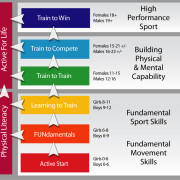LTAD PHASE 1 AND 2
In an earlier newsletter we introduced the Canadian Sport Centres Long Term Athlete Development (LTAD) program by giving a short overview of all of the stages. The LTAD focuses on the general framework of athlete development with special reference to growth, maturation and development, trainability, and sport system alignment and integration.
Last week we defined Physical Literacy and discussed the importance of the development of movement and sport skills in the early stages of a child’s life. Previous research has demonstrated that without the development of these fundamental skills, many children and youth choose to withdraw from sport and turn to more inactive and/or unhealthy choices during their leisure time.
Fundamental skills are typically broken into three movement categories including stability, locomotor, and manipulative. The developmental process involves a sequence that sees stability skills develop first, followed by locomotor skills and finally manipulative skills. Within each category there is a typical progression amongst the skills and between categories of skill development. In other words gross motor skills develop prior to fine motor skills, rudimentary to mature form of a skill.
Stability skills include body rolling, dodging, balancing, bending, stretching, twisting, turning, swinging stopping, rocking, push, pull, rise, collapse, sway, spin and shake.
Locomotor skills include walking, running, jumping, hopping, galloping, sliding, skipping, leaping, chasing, climbing and fleeing.
Manipulative skills include underhand throw/roll, overhand throw, catching, kicking, striking, punting, dribble with feet and hands, volleying, trapping.
Phase one of the development of these skills is called Active Start and is for 0 – 6 year old’s. This stage is simply getting fun activity each and every day and not being sedentary for more than 60 minutes except sleep times. A quick look at the stability skills above will indicate that our introduction to physical literacy starts at the very earliest moments of life and never stops its slow yet rapid progression. In the first year of our life we will have some kind of interaction with almost all of the skills from all three categories. Movement education, early gymnastics, combo sport programs, dance, skating, skiing, and swimming classes are excellent for this group.
Phase two as we are defining it includes the FUNdamental stage and the Learn to Train stage. These two stages take us from age 6 to about age 11 or 12 and should see the child have basic competence is all fundamental movement skills and a good introduction to sport skills. In other words FUNdamental movement skills and FUNdamental sport skills equal Physical Literacy. It is also very important that these skills be developed before the onset of the adolescent growth spurt. The basic movement skills of 3 activities provide the base for all other sports…Athletics: run, jump, throw; Gymnastics: agility, balance, coordination, speed; Swimming for water safety reasons and for balance in a buoyant environment.
The Canadian Sport for Life lists the fundamental skills for these stages as follows…
Travelling Skills: boosting, climbing, eggbeater, galloping, gliding, hopping, ice picking, jumping, leaping, poling, running, sculling, skating, skipping, sliding, swimming, swinging, wheeling…
Object Control Skills: Sending: kicking, punting, rolling (ball), strike (ball, puck, ring), throwing. Receiving: catching, stopping, trapping. Travelling with: dribbling (feet), dribbling (hands), dribbling (stick). Receiving and Sending: striking (bat), striking (stick), volleying
Balance Movements: balancing/centering, body rolling, dodging, eggbeater, floating, landing, ready position, sinking/falling, spinning, stopping, stretching/curling, swinging, twisting/turning.
Exposing children 6 – 9 years of age to 9 – 12 years of age to all of these skills increases the childs ability to participate in sport and activity with success and fun. Maybe more to the point, without this stage a child will never be able to compete – even on the community playground. This is the start to a lifestyle that includes regular activity and healthy choices…
This list of skills is the same for children with a disability, again to increase their ability to participate in recreational and sport activities.
The FUNdamental stage is critical to create the foundation of many advanced skills. Skill development during this time period is best achieved with a combination of unstructured play and quality instruction from knowledgeable leaders and coaches. Children should be introduced to a wide variety of activities and sports.
The Learn to Train stage is the most important stage for the development of sport specific skills as it is a period of accelerated learning of coordination and fine motor skills. It is often a time when children will enjoy practicing skills on their own. It is CRITICAL to note that this period should include the greatest variety in activity and sport. Specialization during this stage can often impact the child’s ability to compete at the highest levels later as they do not develop a full bag of skills if they specialize to early.
More information can be found at ltad.ca or ask me to see many of the Canadian Sport Centre’s resource materials.




